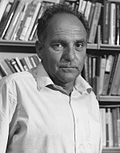Ernest André Gellner FRAI (9 December 1925 – 5 November 1995) was a British-Czech philosopher and social anthropologist described by The Daily Telegraph...
26 KB (2,696 words) - 13:53, 26 July 2024
Gellner's theory of nationalism was developed by Ernest Gellner over a number of publications from around the early 1960s to his 1995 death. Gellner discussed...
10 KB (1,173 words) - 10:11, 20 December 2023
National identity (section Ernest Gellner)
pressures. Unlike Benedict Anderson, Gellner thought nations were not "imagined communities". In his book, Ernest Gellner explained how he thought nations...
39 KB (4,251 words) - 16:38, 14 July 2024
nationalism. Prominent modernization scholars, such as Benedict Anderson, Ernest Gellner and Eric Hobsbawn, say nationalism arose with modernization during the...
16 KB (1,935 words) - 17:55, 6 March 2024
Origins of society (section Ernest Gellner)
suppress deviant behaviour. Human beings, writes social anthropologist Ernest Gellner, are not genetically programmed to be members of this or that social...
38 KB (5,534 words) - 18:46, 7 July 2024
Gellner is a Jewish surname, that may refer to: Ernest Gellner (1925–1995), British philosopher František Gellner (1881–1914), Czech writer Julius Gellner...
407 bytes (73 words) - 14:54, 20 September 2023
Sociology of religion (section Ernest Gellner)
location that it occupied in pre-modern times. Unlike Wilson and Weber, Ernest Gellner (1974) acknowledges that there are drawbacks to living in a world whose...
54 KB (7,006 words) - 04:17, 15 May 2024
Nations and Nationalism (book) (category Books by Ernest Gellner)
by the philosopher Ernest Gellner, in which the author expands on his theory of nationalism. O'Leary describes the book as "Gellner's most elaborate statement...
2 KB (196 words) - 08:50, 25 January 2023
(Oxford 1996), "Introduction", 8–9 Gellner, Ernest (1983) Nations and Nationalism. Oxford: Blackwell. Ernest Gellner (1997) Nationalism. London: Weidenfeld...
86 KB (9,973 words) - 17:47, 2 July 2024
the sense of wholeness it once provided, to a disenchanted modernity. Ernest Gellner argued that, although disenchantment was the inevitable product of modernity...
11 KB (1,125 words) - 20:31, 24 July 2024



